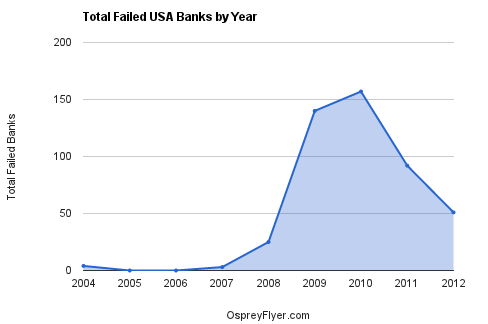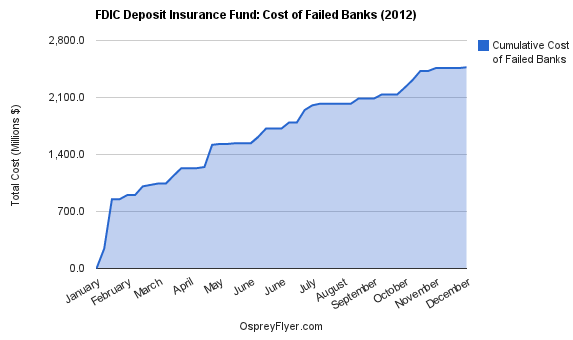Bank failures skyrocketed in 2009 and 2010 to 140 and 157, respectively: a two-year total of 297 compared to 32 from 2004 through 2008. Bank failures in 2011 continued at a high rate of 92. The total 2012 bank closings dropped significantly to 51, a four-year low.
States where banks were seized by the FDIC in 2012 (in alphabetical order): Alabama 1, California 1, Florida 8, Georgia 10, Illinois 8, Indiana 1, Kansas 1, Maryland 2, Michigan 1, Minnesota 4, Missouri 4, New Jersey 1, North Carolina 1, Oklahoma 1, Pennsylvania 2, South Carolina 2, Tennessee 3.
Florida, Georgia and Illinois accounted for 26 total or 51% of all bank failures in 2012. These three states accounted for 45 total or 49% of all bank failures in 2011.
Cost Of Failed Banks
The total estimated cost to the FDIC Deposit Insurance Fund for the 2012 bank closures was estimated at $2.47 billion. The banking system institutions pay this cost via assessments by the FDIC.
The Most Costly 2012 Failed Banks To The Deposit Insurance Fund:
- Tennessee Commerce Bank, Franklin, TN $416.8M
- The First State Bank, Stockbridge, GA $216.2M
- Inter Savings Bank FSB, Maple Grove, MN $117.5M
- Fidelity Bank, Dearborn, MI $92.8M
- NOVA Bank, Berwyn, PA $91.2M
- First Guaranty Bank & Trust Company of Jacksonville, Jacksonville, FL $82.0M
- Second Federal Savings and Loan Association of Chicago, Chicago, IL $76.9M
- Plantation Federal Bank, Pawleys Island, SC $76.0M
- BankEast, Knoxville, TN $75.6M
- Montgomery Bank & Trust, Ailey, GA $75.2M
